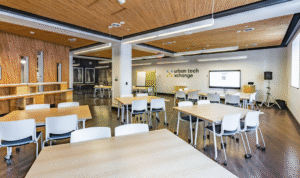
- Kim Kisner
- Business
- 07/05/2023
Why “Social” Before “Environmental” in ESG Matters
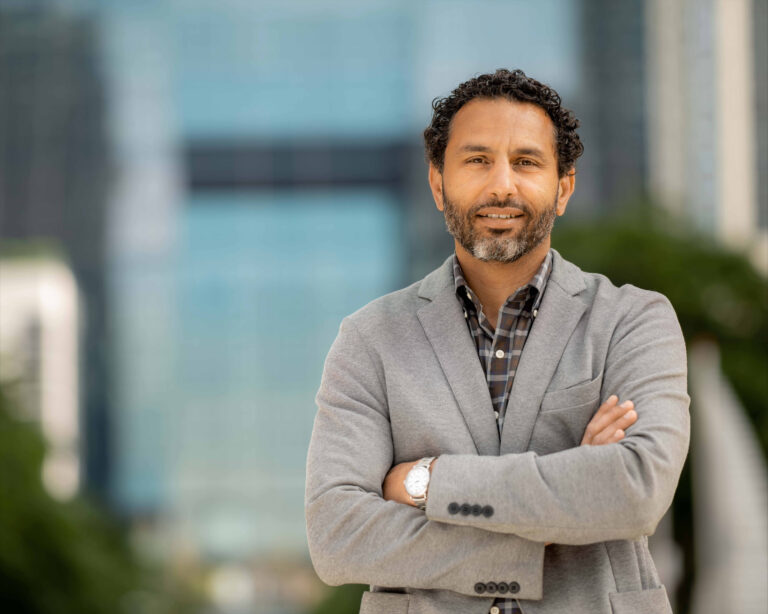
The work of AECOM Great Lakes Inc., which moved its primary office housing about 75 employees to Detroit last year, is the designer and builder of the Gordie Howe International Bridge, is designing the Henry Ford Macomb Hospital expansion, and also is working on I-75 and I-696 replacement work in addition to other infrastructure projects.
The office is part of Dallas-based AECOM – ranked No. 310 on the 2023 Fortune 500 – which works on infrastructure projects across the globe.
SBN Detroit talked with G. Jerry Attia, AECOM Great Lakes vice president and managing principal, about how the company thinks about and acts on sustainability and how its presence in Detroit impacts the city and Southeast Michigan.
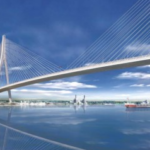
Q: What should we know about AECOM’s approach to sustainability?
A: AECOM is the world’s largest infrastructure consulting firm, and we design infrastructure in four main areas:
- Vertical infrastructure – mostly buildings and anything vertical.
- Horizontal infrastructure that consists mostly of transportation systems such as highways, train rails, rapid transit, and other transportation systems, etc.
- Underground water infrastructure including stormwater management systems, water distribution systems, and other electrical systems.
- Program management for infrastructure systems that fall outside of those three groups.
We also have an environmental business. When it comes to sustainability, everything we do uses carbon, so we have a large focus on the environment and resilience around infrastructure and building decisions.
Within our new office in Detroit, when it comes to ESG (environmental, social, and governance) we put a lot of emphasis on the S – making good social decisions. In today’s market, often the “E” takes precedence over the “S,” and in cities like Detroit, the “S” must come first. Understanding the needs and constantly seeking the voice of disenfranchised people as to how they interact with infrastructure is paramount.
So, we like to think about the “whom” in infrastructure. There has been a history of poorly made infrastructure decisions that have adversely affected certain social groups and as such they become less resilient.
One example of this is the highway designs and redlining that happened in the ‘50s and continues to this day. Infrastructure is developed to enhance the economy and create economic development but often is not focused on the needs of disenfranchised people. A lot of my work in Detroit is focused on advancing opportunities for African Americans in engineering and architecture.
Q: Will you elaborate a bit on how you think AECOM’s approach now keeps in mind the “whom” in infrastructure so as to not adversely affect certain social groups?
A: I always insist we do two things we did not use to do on every project. First, we seek out the most diverse team possible – including gender, racial, and ethnic diversity. I believe that diversity of thought is the key to creativity.
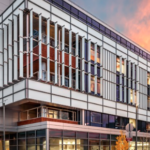
Second, we seek out as many people who are going to be affected by the imposition of whatever infrastructure project or building we are considering and get their perspectives in advance. This means get out of the C-suite and into the user groups, look for unintended consequences of actions, study history to understand the shortcoming of previous infrastructure projects, look for consensus and collaboration among people and seize on it, address the concerns as thoughtfully as possible, and incorporate the affected individuals needs into the solution.
Design thinking can be really helpful when solving big problems. I work to lead the team to look always look for multiple benefit solutions, always be empathetic, and always seek out unique perspectives to understand a problem more deeply. And that only happens with diversity.
Q: Has AECOM always had this focus on sustainability?
A: It’s an important legacy for all of us, and AECOM formally adopted an ESG profile about three years ago. We are a $14 billion organization with nearly 45,000 employees and we are not as diverse as I think we should be. But I’m proud to say that when you look at the Detroit office it’s a strong representation of our city.
Q: Your website says that you are leading the change towards a more sustainable and equitable future, partnering with those who want to make a positive difference in the world. How and who in Southeast Michigan are you partnering with?
A: We talk about this in a couple of ways.
We seek clients who are interested in doing the right thing for the environment in general. Most municipalities and government entities are focused on it and we work with several of them – Oakland County, Wayne County, the City of Detroit, and more.
By and large, AECOM can teach as much as do. We look for minority partners who share our interest in advancing opportunities for disenfranchised people. I think the size of AECOM and our depth and breadth of work gives us a platform to serve as a good example to others.
Q: How do you think the decision to move your primary office in Michigan to downtown Detroit speaks to the revitalization of Detroit?
A: Yes, we moved our primary office in June 2022 to Willis and Woodward in the Cass Corridor. We had planned to do so earlier but due to the pandemic, it took longer than we had wanted.
Large companies bring economic development opportunities to the areas in which they are located, so I think AECOM’s presence in Detroit helps to contribute to the city in some key ways, such as paying city taxes, employing Detroiters, and bringing our employees to the area to help the restaurants and retail, etc. I’d like to see more companies do this.
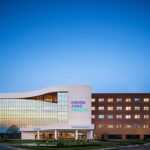
Q: How do you think the work that you are doing now out of this new office impacts sustainability in and around Detroit?
A: We look at every project through the lens of sustainability, resilience, and diversity and I think our presence helps more people use this lens for the city.
Sustainability is just as much about society as it is about the environment and good decision-making around infrastructure regarding this is vital.
Q: How important is choosing suppliers and partners that also have a sustainability focus?
A: It’s extremely important to us. The question of who benefits from our work is always asked.
AECOM is an economic development engine. The projects we work on and engage in create economic opportunities on all sides. For example, new transportation systems create opportunities for new jobs within AECOM and also as a function of the end product on the development side, allowing people access to jobs as a result.
Another example is broadband. People can develop economic opportunities out of their living rooms because they can sit in their houses and work. When we develop these broadband infrastructures, we need to focus on who benefits and how so we can create that lever that maximizes benefits for all users.
Q: Does the new office in Detroit mean more job opportunities?
A: Yes, again on both ends of the spectrum. Projects create job creation, so if we are building a hospital the development and construction of that hospital creates jobs. When the hospital is up and running, it then hires people.
Putting our office in Detroit gives us a pool of people we can hire and that is important. We are working on adding value to the city as we develop more and more services for the community.
We have a part in just about every major construction or design project happening in the area. We have thousands of very talented and specifically trained engineers who focus on not just revenue but measuring the impact each project has on the community to determine who and how social groups are benefiting.
Be sure to subscribe to our newsletter for regular updates on sustainable business practices in and around Detroit.
Kim Kisner
- All
- Business
- Community
- Education
- Events

Eastern Market Partnership, in collaboration with the City of Detroit’s Office of Sustainability Urban Agriculture Division, has announced $240,000 in grant funding to support Detroit-based farmers and farmer collectives. The grants will advance food access, climate education, sustainable land use, and economic opportunity, with priority given to Black- and Indigenous-led farms, youth-led initiatives, and projects rooted in historically disinvested neighborhoods. The recipients – ranging from cooperatives and community...

Citizen Robotics is a Detroit-based nonprofit that advances the use of robotics and digital manufacturing in residential construction, focusing on improving productivity, sustainability, and long-term affordability. Best known for its early work in 3D-printed housing, it explores how alternative construction methods and new financial models can reduce material waste, lower lifetime operating costs, and enhance the resilience of homes. SBN Detroit interviewed Tom Woodman, founder and president of...
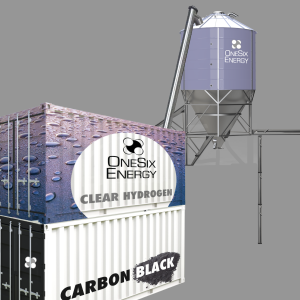
Detroit-based OneSix Energy is a clean-energy technology company focused on advancing a lower-carbon approach to hydrogen production. Headquartered at Newlab in Detroit, the startup is developing a proprietary methane pyrolysis system designed to produce hydrogen without carbon dioxide emissions, while also generating solid carbon as a co-product. SBN Detroit interviewed with cofounder Stefan Sysko about the company’s origins, its approach to hydrogen production, and why Detroit is positioned...






